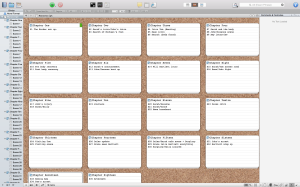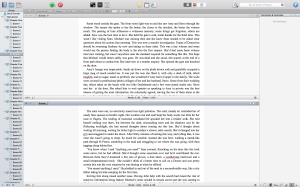Darryl Donaghue's Blog, page 2
February 10, 2015
Preparing for my weekend freebie promo
The original plan was to use my select free days when my I released my second novel. That way, as is often touted, I would benefit from knock on sales from the second book. Sound advice, but as the second book is taking a little longer than expected, delaying it further than the 90 days from release of Journal of Sin. Knowing I had to use them at some point, I figured I’d push the boat out a little early.
I’d spent the last six months reading up on marketing ideas, results and the benefit of forward planning. Despite absorbing all the advice the internet had to offer, I still thought it best to wait to the last minute before having a mild panic attack that no one would pick it up. I booked the Select deal on Thursday to run the following Saturday and Sunday, giving me only a couple of days to prepare.
Most of the sites I found needed to be given a little more notice or had a minimum review limit. Journal of Sin has 4.5 stars from four reviews in the US and 4.3 from six in the UK, which doesn’t qualify it for some promotional sites. Indie Book Bargains accepted it and made me their featured author too which was a nice surprise. I even have the badge to prove it.
I used Tweetdeck to schedule tweets every two hours using a mix of hashtags: #crimefiction #freebooks #freekindlebooks #freedownload . I also included a picture of the book cover. The cover receives regular compliments, so adding it along with the title and a tweet-friendly blurb wasn’t going to hurt.
E.L Wicker suggested going to the World Literary Cafe and signing up for a ‘Tweetsplash’. At first I wondered what that was. It didn’t sound too pleasant, but it turns out it can all be done ruining your shoes. I uploaded my tweets here and tweeted everyone else’s who had done the same. It felt a little strange retweeting and promoting books I’d never read, but I accept it’s part of the game in the early days.
On the Sunday, I found a list of sites that accept free books on the day they’re free. Perfect for any lazy people who leave everything to the last minute. Ahem. I uploaded my book to Snicks list for a dollar, based solely on the fact it was at the top of the list (I hope you didn’t come here expecting insights from a master marketer! Top of the list is always best, right?).
And finally, Facebook. Again, I had a helpful list of Facebook groups that accept free books. I added them all and waited for the group acceptances. Not all have came back in time, but I uploaded my books to the ones that did.
I thought I had the final figures earlier, but the graph keeps changing! I’ll let you know once the final results are in and give my thoughts on the outlets I used.
February 9, 2015
Thoughts on…selling my first one hundred copies.
Selling my first 100 books was a nice landmark. The first sale was nice and the first ten were pleasant. There’s just something nice about 100. I imagine they’ll be something nice about 1,000 and beyond too, but 100 still seems so intimate. There’s a hundred people somewhere with my book on their kindles. Some have read it already and have said some nice things. Others have yet to read it and some may never read it all, but they all have it. Maybe it’s sat between big bestsellers on an ever extending to-be-read list, or maybe they read exclusively indies. Some may have taken a gamble on a new author. A few may have been wowed into an impulse purchase based on something that connected deep within them and others, others may routinely by anything at 99p. I’m sure at least one sheepish soul would raise their hand to say their wayward child tapped randomly on the family tablet, and bought it by mistake.
I want to gather them all in a hall, serve them mini quiche and wine on arrival, and ask them why they clicked, hear their thoughts and ideas how to how they found it, find out the things they liked and the parts where it was all too easy to put down.
I couldn’t do that with 1,000. Hiring a larger venue would eat into the appetiser budget and I’d worry about running around being a perfect host for all the readers who took the time to come. It’s difficult to imagine a meaningful conversation with a thousand people, so for convenience I’d probably end up giving a speech, defeating the whole point. They’d heard enough from me in my book; the plan was for me to hear from them.
A hundred though. A hundred I could do.
January 27, 2015
A Night in the Cells with….Shannon Cook
Let’s find out a little about her. Shannon was born in Tennessee in 1977. The first library book she ever checked out was Lois Lenski’s The Little Auto, at the ripe old age of three. Growing up, she always dreamed of having a job that revolved around reading books. After studying creative writing at Marlboro College and then doing all manner of things unrelated to those studies, she answered a help wanted ad for Dreamspinner Press. She’s been working with Dreamspinner as a freelance proofreader and editor for over two years now and has recently begun offering copy editing services to independent authors.
Q: Tell me, Shannon, what does a copy-editor do? Aren’t you just a human spell check?
A: A copy editor (also often referred to as a proofreader) corrects all those little errors that can trip your reader up and pull them out of your story. Incorrect grammar and punctuation, missed words, shifts in verb tense, continuity errors. And yes, spelling, too. I go a little deeper than that, though, when I feel it’s necessary. If I come across something that, as a reader, I might question or misunderstand, I point that out and make suggestions on how to fix it. Spell check definitely doesn’t do all that, unless it’s been upgraded since I got Word 2010.
Q: Can you describe your copyediting process?
A: First, a shot of whiskey. Kidding, of course. I prefer tequila. Normally I just dive right in, going slowly, making sure I’m reading absolutely every word. I fix the smaller, easier errors along the way, and then if there’s anything that’s more involved, like a really awkward sentence or something kind of unusual that I’m not certain how to fix offhand, I’ll flag that with a comment and go back later to address it in-depth. After I’ve gone through the entire manuscript and made all my corrections and suggestions, I go back through each change one more time and double check my own work. The last thing I want to do is introduce errors when I’m trying to fix them!
Q: There are a lot of apps, programs and functions (e.g spelling and grammar checkers) that are supposed to assist writers with the technical aspects of their craft. Do you find these help or hinder authors in their pursuit of a flawless manuscript?
A: I definitely think they can be helpful up to a point and can be a good learning tool for someone who’s just starting out. It’s really a matter of deciding when to adhere to the guidance a particular program is giving and when to just do your own thing. For instance, if you know you’re a terrible speller, maybe take a look at what your spell check has to tell you. But if you deliberately write with lots of sentence fragments, grammar check is probably going to make you want to scream. I think it’s important to remember that no program is going to be comprehensive or understand how to play with language the way an actual human being does. That said, I do leave my grammar check and spell check on, but I generally end up ignoring them.
Q: The publishing industry has changed dramatically over the years with the advent of a more credible self-publishing model. Some say it’s for the worse, with literary standards dropping, others say the change has been long overdue. What’s your take on the last few years?
A: I think the changes in publishing are great, and I’m definitely not just saying that because it means I don’t have to work for a big publishing house. There are always going to be people who say the sky is falling and standards right along with it. But there are so many people who have great stories to tell, and the last few years have given them a chance to send those stories out to the rest of us without having to jump through a lot of hoops or get someone’s permission first. I think that’s a truly wonderful thing. So far as standards, I think most authors take their work pretty seriously, so I don’t see that being an issue in the big scheme of things. Plus, I think readers can be trusted to recognize and appreciate quality much more than they’re given credit for by some people in the publishing industry.
Q: What are the most common errors you see in an authors work?
A: I see a lot of errors where an author clearly has a particular word in mind, but they’ve written a similar word instead, something that is either a homophone or a random misspelling that’s one letter off. For instance, “coach” instead of “couch” or “flash” instead of “flush.” It can certainly make for some entertaining reading.
Q: What advice would you give to new authors?
A: Invest in your work. Invest the time to make your story what you want it to be. Get feedback from people you trust. Join an online community, even if all you ever do there is lurk. There are so many authors out there willing to share their wisdom and experience (or to just commiserate for a while, if that’s what you need). As solitary as writing can be, you really don’t have to go it alone. And most importantly, when your manuscript is finally done, hire a copy editor!
Well, it sounds like that all checks out. Looks like we’re releasing another one with no charges. Sigh. RELEASE THE PRISONER!
January 13, 2015
A Night in the Cells with…Andrei Cherascu
It feels a little safer in the cells this week. We’ve rubbed garlic on the window frames and doused the doors in holy water. There’ll be no vampires getting in here again. Especially not any of the sparkly kind.
But there is something sparkling in the cells tonight. The faint whiff of sparkling champagne coming from our latest detainee’s breath. Champagne he says he consumed whist celebrating winning an award for the best Sci-fi novel of 2014 at scifi365.net. A likely story if I ever heard one. The only award winner in this town is Mr. Raj’s award winning Lamb Bhuna, and once I’m done with this scallywag, that’s exactly where I’m heading. Before we bring Mr. Sparklepants out from his ‘dressing room,’ let’s find out a little more about him.
Andrei Cherascu was born in 1985. He’s always had a passion for books and loves science-fiction the most. He gained a Master’s Degree in American Studies and wrote his thesis on the music of Tom Waits. After graduating, he took a job in IT support, but always felt like something was missing. After attending his friends wedding in the Dominican Republic and having a near-fatal incident with a knife-wielding hooker, he realised his time was precious. With the support of his loving wife and family, he quit his soul-destroying job to become a full-time writer.
for books and loves science-fiction the most. He gained a Master’s Degree in American Studies and wrote his thesis on the music of Tom Waits. After graduating, he took a job in IT support, but always felt like something was missing. After attending his friends wedding in the Dominican Republic and having a near-fatal incident with a knife-wielding hooker, he realised his time was precious. With the support of his loving wife and family, he quit his soul-destroying job to become a full-time writer.
In September 2014, he published Mindguard, the science-fiction novel he’d dreamt about writing his whole life.
Well, we’ve seized his award until he can prove he obtained it through legitimate and lawful means. Let’s see what he has to say. BRING OUT THE SUSPECT!
MindGuard has been described as exciting new science-fiction – Tell us about the story in a few concise sentences.
Mindguard takes place in a future world, where telepathy has become a threat to information and privacy. To protect their sensitive “data”, influential people turn to the services of mindguards – powerful telepaths who possess the ability to shield their client’s thoughts from outside aggression.
The story follows Sheldon Ayers, the world’s most accomplished 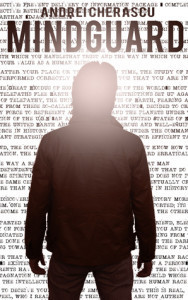 mindguard, who is tasked with protecting the integrity of a young woman’s mind. He is told the content of the “information package” she carries is vital to the future of mankind. As is often the case with sensitive information, it attracts the attention of certain external forces, in this case a band of ruthless military operatives whose mission is to stop this information package from reaching its destination.
mindguard, who is tasked with protecting the integrity of a young woman’s mind. He is told the content of the “information package” she carries is vital to the future of mankind. As is often the case with sensitive information, it attracts the attention of certain external forces, in this case a band of ruthless military operatives whose mission is to stop this information package from reaching its destination.
It’s the time-tested recipe for conflict: different people wanting the same thing, who will stop at nothing to attain it.
It is said good science-fiction acts as social commentary on today’s world. What modern issues inspired MindGuard?
I think information privacy is definitely a modern issue, brought to the forefront by recent revelations regarding surveillance and intelligence gathering. It’s certainly a sensitive topic. But it didn’t necessarily “inspire” mindguard. In this case, the story followed the character. The narrative developed organically from the whole concept of this fictional profession. First I came up with the idea of a mindguard and then started imagining what such a person’s activity would look like, what type of environment would have to exist in order to justify such a character’s existence.
Being a full-time writer must feel like a dream come true. How did making that decision feel?
Well, it wasn’t something I just dove into head-first. My wife and I had planned on making this move for a long time. We were just waiting for the right moment, when we would be in a position financially for her to become the primary breadwinner for a while. A stable income is not something easily abandoned. But I felt I needed to make the move while I was still young enough to afford to fail and start anew. So, when the opportunity presented itself, we took it.
October 19th 2012 is a very special day for me. It was my last day at work. My dad picked me up at 17:00, we went shopping for some nice craft beer, came over to my place and drank to my new career. It really was a dream come true, one that many don’t ever get to experience. I’m so grateful for it and I always will be. I think I’d liken the feeling to that of coming home after a being away for a long time.
The first two weeks were like a fairy tale. The first thing I did was take a few days “off”, so to speak. I drank wine, listened to jazz and dusted the house, dancing around in my pajamas like Mrs. Doubtfire. Then, I eased into work and, after a couple of weeks, I was already spending more than eight hours a day working in my little home office.
An incident with a knife-wielding hooker? I’ve gotta ask….?
You know, I told this story so many times I think it’s only fitting that I finally write it down for a crime author’s website. In 2012 my wife and I traveled to the Dominican Republic for my friend’s wedding. I was a groomsman, by the way. Anyway, since the trip was going to be long as hell, we decided to first fly to Punta Cana and spend a few days relaxing on the beach before heading out to Santo Domingo for the wedding. We took a bus from a town called Bavaro. It was supposed to drop us off at Enriquillo Park, where my buddy’s father in law was going to wait for us.
It must have brought us to the wrong place. Before we got off, the local woman sitting in front of me ominously said, “Be careful”. I’ll never forget that warning – or her face – as long as I live. When we got off the bus, we found that we were in something that looked suspiciously unlike a park and decidedly like the place you would drop off two tourists to get mugged and/or killed.
My friend’s father-in-law was nowhere to be seen (later, he said he had waited at the actual Enriquillo Park, meaning we had definitely been taken somewhere else). Anyway, instead of him, we found a group of junkies and a hooker whose dilated pupils predicted nothing good.
She asked me if I’m “hungry” (which I was, but I don’t think she meant it literally), I said “no” and she freaked out. She started yelling in Spanish, taking off her clothes and wig (?!?) and then pulled a knife on us. Out of nowhere, a car showed up. The driver asked us if we needed a “taxi” (I’m positive that vehicle was not a taxi) but we got in anyway to get away from the crazy woman. She followed us in. She sat down next to the driver and started yelling at him, telling him that we were “hers” (I don’t speak a lot of Spanish, but I understood that). She tried to stab him with the knife but he wrestled it away from her. He pulled her out of the car and beat the ever-loving shit out of her until she fled.
He showed us the knife and told us she was going to kill us with it. Initially, I thought the whole thing was an act and that they were in cahoots but then the “cab fare” ended up being eight dollars or something. I’m sure he knew I would have given him a hundred dollars just to get us the f**k out of there. Anyway, all ended well, the rest of the trip was fantastic and I ended up with a cool story to tell absolutely everyone I meet until the end of time.
There’s more to you than just writing. You also have a music blog called The Music and Myth. What was the inspiration behind that?
I decided to create The Music and Myth essentially as a place to hone my craft. I hadn’t written in six years and was looking for a writing endeavor that would allow me to slowly get comfortable with spending a few hours in front of the keyboard. I decided to start a blog. Writing about music just came naturally to me. I’m a huge music lover, very passionate about it – especially jazz. But I’ll listen to anything that’s good. I started posting weekly in-depth reviews of records and related articles. Slowly, the website started growing and building an audience. Before I knew it, I was covering events and interviewing the likes of Al DiMeola, Terri Lyne Carrington and Neil Cowley. I even have my own Music and Myth Awards. Now, two and a half years later, The Music and Myth has become the one constant in my life when it comes to writing. It’s a project that is very close to my heart.
Tell us about the moment you found out you’d won Sci-Fi book of the year.
The Book of the Year thing happened at just the right time. I was coming off a difficult few weeks, for various reasons, and creatively I was in a bind. I was just generally feeling down. When I got the e-mail, I was at a friend’s birthday party. As you can imagine, I was overjoyed.
It’s an incredible honor for me as a debuting author to receive such validation for my work. You know, as an author, how difficult it is to stand out in this market. There’s an enormous number of new books being put out every year and many of them are very good. Having my novel chosen Book of the Year 2014 means I have something to help me stand out from the rest, which is immensely important from a marketing stand point. Psychologically, it was even more important. It gave me renewed hope and energy for the future.
Now, let’s see if you can recite an excerpt from your book:
When Sheldon turned around, his usually inexpressive face was a mask of disbelief. Like a skilled prizefighter delivering a knockout blow, Miller did not waste a second. “Perhaps I can arrange for the Council to grant you access to your beloved grandfather,” he said, smiling in certain victory.
Ross didn’t know if Sheldon was going to start yelling and cursing or crying, or if he would attack Miller or run away or perhaps curl up into a fetal position and just rock back and forward. At that moment, all those reactions seemed equally possible. His friend did none of those things.
“That’s not possible,” Sheldon said, struggling to remain calm.
“I’m sure you can imagine, Mr. Ayers, that I am a very well connected man.”
“You know what I mean!”
Sheldon silently looked at Miller for a long time. His stare was so cold that Ross was surprised Horatio didn’t ask his brother to fetch him a sweater.
“You have, no doubt, heard the rumors,” Miller said. “Now I’m telling you that they are true.”
Sheldon looked like he wanted to hit the man. Ross could not remember the last time he had seen his partner even remotely angry.
“You’ve found a way to communicate with the uploaded minds,” Sheldon half whispered. His voice was cold and it sounded hollow; he seemed to be trying very hard to control his anger.
“To a very modest extent. But it is possible. My company developed an algorithm which enables limited two-sided communication in the form of single-line true/false responses from IDIs – Individual Data Identities.
“People can communicate with the memories in the archives,” Sheldon said slowly, as if he were formulating an accusation before a court of law, “and you kept the information to yourselves?”
“Look, Mr. Ayers, it is a very recent breakthrough, still in the early stages of development. I’m sure you understand that access to the memories cannot realistically be made available to everyone.”
“I’m sure you make it available to yourselves.”
“Now listen here,” Marcus barked. “If it were not for funding from Mylonas Industries, most of the technology that even makes it possible for the vast quantity of data to be stored in the archives would not even exist. The funds are provided by my brother. Now, if you don’t believe this entitles him to certain privileges offered by the technology he helps to develop, then that is merely your own opinion, Mr. Ayers.”
“Also,“ Horatio stepped in with an appeasing voice, “at this stage the main priority is developing a faster and more complex method of communication. Our scientists are collaborating with the archive itself to make that possible, hopefully sometime in the next five to ten years. But this can only be achieved if we benefit from discretion.”
“And people like yourself decide the boundaries of this discretion, Educator Miller?” It was the first time that Sheldon referred to Horatio as ‘Educator’ and it had sounded like an accusation. Ross, who was quietly following the conversation, could no longer remain silent.
“Enough!”
He raised his voice at Sheldon, like a father at a misbehaved son. “Listen, Sheldon, you either take the case and get the opportunity to communicate with what’s left of Kinsey’s mind, or you walk away, but you are done splitting hairs and you are done wasting everybody’s time. You got that? Now, what will it be?”
“All right,” Sheldon said, without even so much as looking at his partner. “Show me to the bathroom,” he ordered Marcus Miller, who unenthusiastically got up and led him out of the cellar, understanding now that the mindguard was a prototech. As if he needed any more reasons to dislike Sheldon, Ross thought. He waited for the two men to exit before confronting his host in private. “You know, I yelled at him but, with all due respect, I should have also yelled at you, Educator.”
“And why is that?” Miller asked, feigning curiosity.
“You were way out of line.”
“Was I?”
“That is not how you conduct business, Educator.”
“That is exactly how you conduct business, Mr. Ross. Especially with a man like Sheldon. He must be intercepted like an adversary, he leaves one no other option.”
“You knew where this was going from the start. You baited him by offering him things you knew he would refuse so that he’d let his guard down. If you had mentioned his grandfather from the start, his anger and resentment might have caused him to impulsively decline. You knew that a man with Sheldon’s pride would never have accepted later on if he had already declined. You manipulated him from the start.”
“I did. Would he have accepted otherwise?”
“You have lost his respect, Educator,” Ross said. The whole conversation left a bitter taste in his mouth.
“I don’t care about his respect, Mr. Ross, I want his services. Now, are we free to ‘seal the deal’?” Horatio poured Ross and himself another glass of wine in anticipated celebration. Ross felt like he wanted to empty the whole bottle right over Miller’s head.
I guess the champagne was well-deserved! Looks like we’ll be giving his award back and releasing Mr. Cherascu from custody. MindGuard is available at Amazon.com and Amazon.co.uk You can read about the Sci-Fi Book of the Year award at scifi365.net. I’m sure Andrei has peaked your interest and you can find out more about him at his writing blog and at The Music The Myth.
RELEASE THE PRISONER!
January 8, 2015
Thoughts on….launching my first book
Dear Discerning Reader,
I published my first novel on December 26th, or thereabouts, depending on your time zone. It was earlier than expected. I’d originally planned to have the book professionally formatted; a process that would have delayed the launch by three or four days. However, after waking up hungover on Christmas morning, I decided to crack on and do it myself. Just as a quick aside, I live on my own in Seoul and Christmas is a little low-key here. I don’t want you thinking I was sat in bed tinkering with HTML tags whilst the family endured (or enjoyed) Christmas preparations without me. Had I been at home in London, that’s what would have happened, but as I wasn’t, it did not. 
Formatting wasn’t as hard as I thought. There are a few ways to go about it and I decided to convert the word document to HTML and then convert that to .mobi. It all sounds rather intimidating, but with the help of Guido Henkel’s formatting guide (via David Gaughran) and mind-expandingly strong coffee, I set to work. I copied the manuscript into Textmate and made the required adjustments. I won’t bore you with the process and it’s all rather dry unless you’re applying it to your own work. If you are going to give it a go, I’d recommend Textmate as it has a few features that make your life much, much easier.
Writing the acknowledgments, contacts, copyright and dedication pages made me feel very professional. I’d written stories before, but they hadn’t had more than a couple of lines of bio attached. These were the bits you only find in real books. Yes, real books also have covers and words in, but I didn’t create the cover and I’d written fictional sentences before. Writing the acknowledgments reminded me about the importance of the people who helped me throughout the process. Independent publishing isn’t, and shouldn’t be, a truly solo venture. Ideas like ‘copyright’ were once distant concepts I didn’t to know about, and that first page of publishing details and edition numbers was something I flicked past to get to the story. Having written my own one and seeing ‘Copyright © 2014 Darryl Donaghue’ and I can really appreciate – who am I kidding? I’m still going to flick past them.
The launch itself was wholly underwhelming. No black tie event or fireworks, just me in my pj’s pressing a button or two and waiting for an email. I had a cup of tea and a biscuit to celebrate. Chocolate Hobnob, of course.
January 4, 2015
A Night in the Cells with E.L Wicker
Good evening discerning readers,
It would seem there’s a new trend amongst the criminal fraternity. There’s been a rise in identity-theft in the publishing industry with people claiming to be authors, aspiring writers, bloggers, the list goes on. Well, starting tonight, we’re going to put a stop to it.
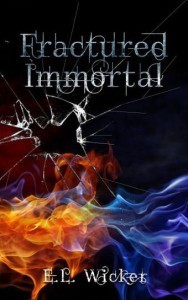
Tonight I have arrested E.L Wicker on suspicion of claiming credit for writing vampire-fiction book, Fractured Immortal.
It doesn’t end there. She’s spent the last ten minutes in the cells screaming about how she has a popular blog and how Fractured Immortal is the first part in something called the Bearwood series. I think this one’s going to be trouble.
Before I bring her out for questioning, let’s see what intel we have on her. E.L Wicker was born in Dun Laoghaire back in ’81. In 1990, she moved to Surrey and discovered a love of writing. She won several writing competitions and became the editor of both her school newspapers. As she grew up, her education absorbed all of her time and writing went by the wayside. In 2013, inspired by her love of music, she began writing Fractured Immortal, her first novel.
Let’s see if her story holds up. She looks lively; I’ll keep the cuffs on this one. BRING OUT THE SUSPECT!
Okay. Let’s start at the beginning. Tell me about your early days as a writer.
The first full book I ever wrote was a rip off of a Point Horror book. I was obsessed with reading them, from The Snowman to The Mall, I read them all. I don’t think they were particularly scary, I just liked the characters in them although I have been mentally scarred by the animals that died in them. I suppose it was like fanfic, I even called the male lead Storm, after the male character in The Mall.
The relationship between music and writing is a recurring theme on your blog. What influence did music have on both the writing process and the themes in Fractured Immortal?
Fractured Immortal was born from images that raced through my head when listening to ‘Let Her Go’ by Passenger. Songs are stories in their own right, beautifully crafted short stories and I love them. It’s never the rhythm that makes me fall in love with a song, it’s the words. Music invokes thoughts, feelings and visions, which is why I listen to music when I get writers block. Many a block has been broken through or an epiphany occurred thanks to music. So you could say that all of my writing from the process to the problems, are based on the images that I see when I listen to music.
Your blog regularly features other authors work, new releases, interviews and cover reveals. How important is it to connect with other authors and what advice would you give to new writers who may be a little nervous about reaching out to people?
This is a many sided thing, first of all connecting with other authors is important because if you come across a problem, they are the ones that can help you through it. Secondly, publishing can be costly so being able to offer free promotion is my way of helping to ease the financial strain of the process. And finally, as we write more we also learn more and that knowledge can be passed on to others. Help and be helped, that’s what it’s all about. If you’re new to the writing process just reach out, you’d be surprised by how many genuine people are out there, willing to lend a hand.
Hmmm. Seems like you can talk the talk. Now, let’s get to the heart of the case. If you ARE the author of Fractured Immortal, you should be able to tell us about it in a few, concise sentences, right?
In a teeny tiny nutshell, Fractured Immortal follows Ilia Rose as she attempts to kill Sol, the vampire responsible for raining misery down on her friends. As Ilia gets closer to revenge, she also becomes closer to Nathaniel, one of Sol’s allies. Nathaniel is not at all what he seems and as his secrets are uncovered, Ilia comes to realize that her part in the battle against Sol is bigger than she ever thought possible.
Fractured Immortal is described as ‘a vampire tale like no other.’ What makes it different?
Ah, my editor wrote that, she’s awesome. I guess it’s because Fractured Immortal is different from a lot of the other vampire tales out there. There are some fantastic vampire books around, all of which are original, however we live in the shadow of some very popular vampire based fiction and the downpour of very similar fiction because of that. It’s important to make our work unique and that’s what I tried to do with Fractured Immortal.
What was the hardest part of writing the book? And the most enjoyable?
The hardest part was staying on track. I never had a set plot to work with, I made it up as I went along so if I took a wrong turn it could end up costly. On the project I’m working on right now, I took several wrong turns and the amount of words I’ve cut because of this is ticking toward the 60k mark – that’s almost a full book, oopsie. The most enjoyable part is seeing the characters I’ve crafted come to life on the pages. My favourite character is Kyle because he was so hard to write, therefore I get the most enjoyment out of seeing him as a fully created character.
Well, all sounds legit so far. There’s just one more thing. Let’s see if you can recite an excerpt from the book verbatim. Just a paragraph or so ought to do it :
My joints burned as they pulled at my limbs, each eager to get the kill. I pulled my left arm free and hit out in an aimless attempt to make contact with one of them, but failed. Vampires clawed at me. White heat spread from the slashes in my skin. With a cry, I tried to hit them again and again until the stake but into flesh.
Looks like it all checks out. Fractured Immortal is out now on Amazon US for $.99 and Amazon UK for 99p, on Kindle Unlimited or available to borrow through the Kindle lenders library. E.L Wicker can be found on Goodreads, Twitter and on her blog, where I’ll be keeping a close eye on her. RELEASE THE PRISONER!
January 2, 2015
Three New Year’s resolutions you probably haven’t considered…
I know it’s only January 3rd and 2015 feels like it’s flying by already, but if you’re yet to set any New Year’s resolutions, here’s three you definitely shouldn’t add to your list:
Write less
I wrote far too much in 2014. I only realised this when I saw just how dire my Candy Crush scores were compared to my the rest of my social circle (or anti-social circle depending on your opinion on mobile gaming). My efforts at crushing candy amounted to a schoolboy stepping on a mint humbug whilst running for the bus, whilst even the least nerdy of my friends spent the year crashing Death Stars into lemon drop planets. There’s only one way to solve it. Less typing; more swiping.
When someone says they have a great idea for my next book, I’m going to genuinely pay attention to the rest the conversation.
I bypassed a lot of great book ideas in 2014. The one where the werewolf pick-pocket spree was stopped by the pre-pubscent wizard detective was just genre-melding genius. When Alison mentioned that capitalising on the nation’s newfound love of Curling, with Curling in Space, it was a moment of unrivalled champagne-induced inspiration. And the third seven-figure advance I missed out on was for Cabbage-Patch Park. Who needs dinosaurs when you can resurrect retro toys? Never again.
Check my book sales more regularly.
As it stands, I only check my sales once every thirty seconds, with a two minute break for lunch and naps every third Sunday. Must refresh more!
December 27, 2014
New Release: A Journal of Sin
My first Crime novel, A Journal of Sin, is out today. I’d planned on releasing it in 2014, so managing that with only a few days to spare feels pretty good. It’ll be a while before I get used to seeing it on the Kindle store!
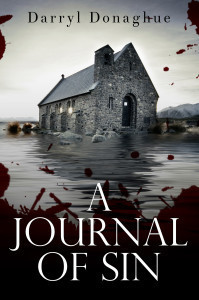
A Journal of Sin is the first in a series of novels that follows PC Sarah Gladstone from her early days as a police officer and through her detective career. The novels are set in modern austerity-era Britain and Sarah is far removed from the cookie-cutter aging, ex-army, alcoholic police officers you may be used to reading about.
The blurb goes a little something like this:
A village, isolated by a severe storm, and a young officer, alone and out of her depth. A troubled priest is brutally murdered, leaving behind a journal of the resident’s confessional secrets; secrets certain people would prefer he took to the grave. As word spreads, the pressure rises as the eyes of the town watch her every move. With no forensic team, no support and a savage killer hiding in a turbulent town, is PC Sarah Gladstone up to the task?
Sound like something you’d be interested in?
The book was edited by wonderfully talented Jane Adams of The Literary Consultancy and author of twenty novels across many genres. Her advice raised the standard of the book tenfold. I was lucky enough to pin down the very busy Shannon Cook of Dreamspinner Press (acting in a freelance capacity) who copyedited the manuscript. She polished the prose to a standard I couldn’t have managed alone and was an absolute pleasure to work with. Kit Foster of KitFosterdesigns created the cover. The incredible standard of his work speaks for itself, so I won’t gush too much here. I’m sure it won’t surprise you to hear that he’ll be working on the covers for the next two books in the series.
Editorial comments on the book include:
‘It’s good to have an inexperienced, female officer take the lead…I think she brings a freshness and honesty to the proceedings and in Sarah you’ve created a well drawn and engaging character.’
– Jane Adams
‘I really enjoyed your story (Journal of Sin is awesome!), and I’m also impressed that you decided to write about a female protagonist rather than a male. Bold choice and brilliant execution.’
- Shannon Cook
Writing Journal of Sin has been an enjoyable challenge. It’s been mine for so long and now it belongs to you, discerning reader.
November 27, 2014
How I’m tackling my Edits
I’ve spent the past few weeks working through Editor’s recommendations on Journal of Sin. It hasn’t really been too much of a chore if I’m honest. I was expecting a thorough professional thrashing, but having now had some time to digest the report, it’s really not so bad. There are some POV shifts that need tidying up, a couple more chapters from the killer’s viewpoint to meet that expectations set by their opening scene and a little more attention given to the wider scene and a couple of side characters.
I decided to tackle it in two major stages – the annotated MS and the full report. I separated each of these into three categories: ‘quick fixes’, ‘a little more work required’ and ‘lock the door and grease the keyboard’ sized issues.
First, I read through the annotated manuscript. Everything that could be attended to then and there promptly was – small typos and omissions (‘of’ is a very small word and easily lost amongst the rush of everything. Repeatedly.), a poorly arranged sentence here or an ill-fitting paragraph better suited to the shredder than the second act were all dealt with in swift order.
After that, I jotted down the midrange and more difficult tasks scene by scene, being sure to highlight where changes in certain places affected other scenes in the book. I set to work on these one by one until they were done. The majority of these were head-hopping POV (one scene in particular could have been lifted from a psychic detective story), some continuity issues and areas of babbled gibberish that needed either clarifying or torching. Most made it in; some did not.
The big issues in the annotations simply referred to the full report where the recommendations were fleshed out and explained. I’m just sitting down to start that now…
November 16, 2014
How I Write – Crafting the Manuscript
Here is the second part of my App reviews where I give a rundown of the various tools I’ve been using to write my first book. In the first part, I talked about planning and plotting and this post will be about the apps I use to write.
I use two main writing apps for two different tasks. I use Scrivener for longer projects and Ommwriter for short stories. Scrivener is full of useful features to plan, plot, research and write novels whereas Ommwriter is a very simplistic word processor.
Scrivener
Let me start by saying that I don’t use Scrivener to it’s full potential. I’ll only mention the features I use, rather than harp on about things I don’t really understand to try and sound like a clever clogs.
Organisation
Scrivener is very good at organising your work using easy to access folders, scenes and notes. The binder section on the left makes your entire book available in a single click allowing you to move between scenes nice and easily. These scenes can be duplicated and moved around which is handy when reading through your drafts and assessing the pace of your story. You can write your notes in the yellow box on the right meaning they’re always open and in view. In the top right of the screen is a ‘synopsis’ section, more on this a little later.
Character/Location sheets
Scrivener has a few handy templates to help keep your work on track. The character sheets sit in the binder and come with some basic headings which can be changed to your liking. This makes it easier to keep your characters consistent. I got into the habit of reading through the character sheet before writing scenes in which they featured, to get my head in the right place. Location sheets help with keeping your locations consistent with useful headings such as ‘unique features,’ ‘sights,’ ‘sounds’ and ‘smells.’ These can be added and tinkered with just like the character sheets.
Corkboard
The corkboard feature mimics the index card organisation system I used to use to plan large projects. It’s a good way of checking the pace of your story and being able to move things around easily and every time you move something the change is duplicated in your draft. You can use tags and coloured labels to represent scenes, conflicts, characters etc.
I use the split-screen mode quite a bit when revising. It’s much quicker to see the previous draft for easy comparisons to the new one without having to minimise/maximise all the time.
Ommwriter
Ommwriter is almost the opposite of Scrivener in that it’s a very simple app. There are no organisational tools and very few formatting options, which is part of the pleasure. The idea behind the app is to create a distraction-free environment allowing you to write unhindered by the various beeps and notifications.
The app has seven different backgrounds, from colour fades to a snowy forest scene, making it by far the most visually appealing word processing programme I’ve ever used. There are also seven different music tracks creating a pleasant ambient background sounds to write to. You can also have different keystroke sounds that emulate the tapping of a typewriter. They’re a nice touch, but the novelty wore thin on me pretty quick.

As pretty as it is, there are very few formatting options (four fonts and four font sizes).You may see this as a pain, or as part of the charm and purpose of the app as it intended. I only use Ommwriter for short stories as it’s tricky to manage larger projects with such a simplistic tool. It’s a great tool and a welcome change from the more sterile, albeit functional, design of many other word processing apps.

